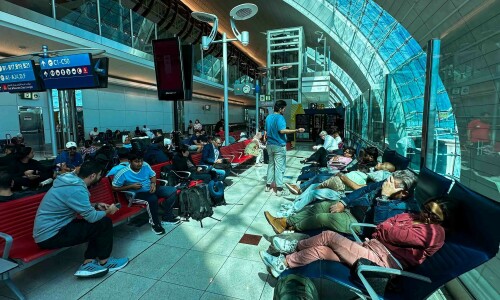PESHAWAR: The Khyber Pakhtunkhwa Health Department has asked for immediate assistance from the UN agencies and donor organisations to provide timely treatment to the flood-stricken people in Chitral.
According to the health officials, the government has announced Rs14.26 million for the healthcare of the flood-affected population, but the health department was yet to receive the amount due to which the people risked outbreak of diseases in Chitral.
Also read :After Chitral, flash floods and rain devastate vast areas across KP
“We fear epidemics of gastroenteritis, diarrhoea, malaria, typhoid, dengue fever, scabies and other diseases in Chitral where we face problems to reach the stranded population and give them treatment facilities,” said senior health officials.
They said that they had been waiting for the release of Rs14 million pledged by the government to provide healthcare facilities to the people on immediate basis.
Seeks assistance of UN agencies, donors
“We need four electricity generators to maintain cold chain of vaccines because over 50 cases of measles have been recorded from the affected areas,” they said. The officials said that during the past four days doctors had examined about 5,000 patients in the flood-hit villages, but there were no arrangements to register diseases’ outbreak and put brakes on epidemics.
The World Health Organisation had pledged two vehicles for the health staff in Chitral to reach the affected population there as so far the people in the inaccessible areas were without treatment facilities.
The officials said that they had held meetings with the UN agencies, who had been requested to provide urgent assistance, especially lady doctors to help the female patients. “There are only two lady doctors who are not enough to reach the patients,” they said.
The officials said that they had been facing a big challenge to transport medicines to the areas where people required urgent medication, especially to protect them against water-borne ailments.
The WHO is establishing a surveillance system to monitor the quantum of diseases and take measures in case of any disease outbreak, they said, adding that the world health agency had also supplied medicines for the people harmed by severe floods.
The disease early warning system is being activated in Chitral under which the health department will get updates regarding diseases on daily basis, they said.
Sources said that the government had planned a strategy for the 11 high-risk districts, including Chitral, but the situation on ground was not up to the mark because of lack of coordination among the government departments. They said that the people required drinking water and essential medicines to protect them against the water-borne diseases. However, accessibility to the affected population remains the main problem in the area, they said.
The sources said that health authorities had been communicating with the department through mobile phone messaging, but the main hurdle was the lack of money to accelerate the healthcare activities in the area.
“We have decided to establish 10 camp hospitals in Chitral and provide health facilities to the people, but we desperately need vehicles to ensure speedy mobility of staff,” they said.
However, the officials said that at present they didn’t know exactly about the health problems and the number of health facilities washed away by floods in Chitral.
Director general health Dr Pervez Kamal told Dawn that they had established a rapid response unit in Chitral which was in contact with the government regarding health problems there. “There is no immediate threat of any disease outbreak there,” he said.
District health officer, Chitral, Dr Israr said that they had provided a big quantity of medicines to the patients, but now they were about to run out of stock. “We have been supplying medicines to the stranded people through helicopters,” he said.
Published in Dawn, July 30th, 2015
On a mobile phone? Get the Dawn Mobile App: Apple Store | Google Play















































